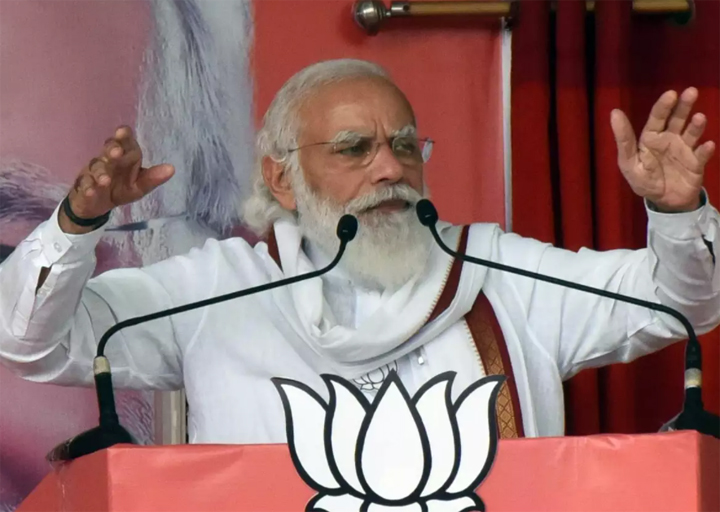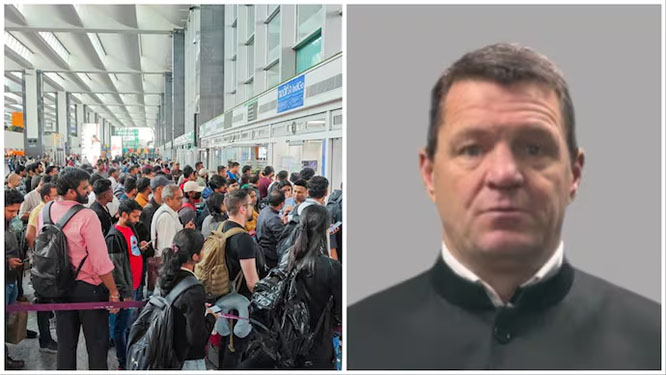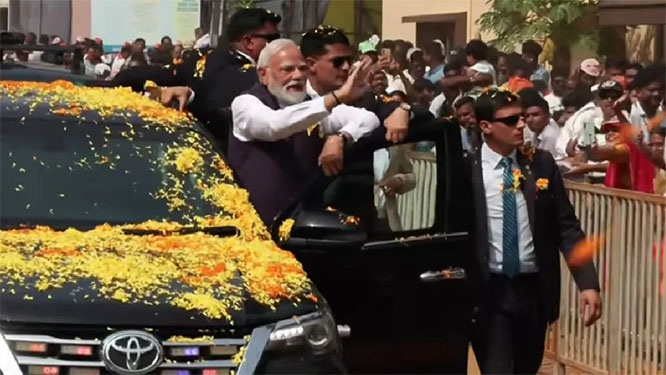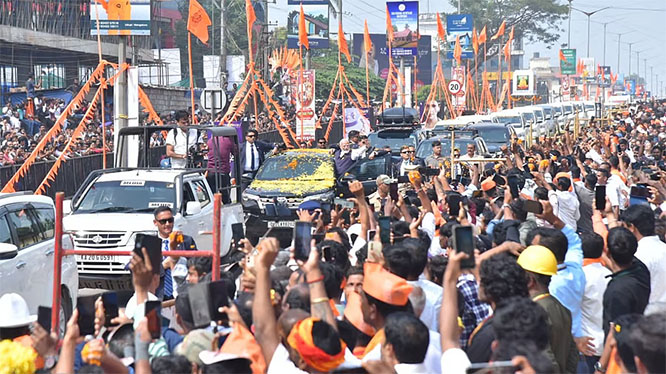
Patna, Oct 28: Prime Minister Narendra Modi on Wednesday said that just like the people of the state can save themselves from COVID-19 with a mask, similarly with a single vote they can save Bihar from becoming "bimar" (sick).
"Just like you can save your self from COVID-19 with a mask, similarly with a single vote you can save Bihar from becoming 'bimar'," said PM Modi while addressing a public rally in Patna.
"In the last decade and a half, Bihar has strongly stepped up the move from misrule to good governance under the leadership of Nitishji. Due to the efforts of the NDA government, Bihar has come a long way from inconvenience to convenience, from darkness to light, from distrust to trust, from kidnapping of industries to opportunities,"
The Prime Minister further said that Atal Bihari Vajpayee used to say that the definition of electricity in Bihar is that the connection here is mostly out of the place. The darkness of the lantern period has now ended in the state, he added.
"Who can fulfill the aspirations of the poor and middle class of Bihar? Can those who looted Bihar do it? Those who only thought of their families and did injustice to everyone can never understand Bihar's expectations. Only NDA can do it," said PM Modi.
"Earlier it was rare to find a doctor in the hospital. Now facilities like medical colleges and AIIMS are in place here. Earlier, there was a demand in the villages that somehow the ravine should be spread but now people now desire wide roads that remain in good condition in every season," he added.
The Prime Minister stated earlier general railway stations were also a dream for Bihar but now the stations are connecting with modern facilities, there is also an aspiration to start new rail routes, he added.
"Those who thought only of their family, did injustice to every single person of Bihar, also took away the rights of Dalits and Backward and deprived, will those people understand the hopes of Bihar?" asked PM Modi.
"Earlier there was a demand for ring road in Patna. When the ring road was built, then the demand for the metro increased. Today when the work on Patna Metro is underway, the expectations of similar facilities have increased in other cities," he added.
Today in all the cities of Bihar, including Patna, works are being carried to address the basic issues like roads, water and sewer.
"Modern treatment plants are also being installed to clean the water of the dirty water from drains falling in Ganga. In the past, unprecedented reforms have been done from education to governance, from farmer to labour, from ease of living to ease of doing business. Today, after three and a half decades, India has received the new National Education Policy has been received," said PM Modi.
He added that due to lack of language and opportunities poor and deprived people of Bihar were at disadvantage earlier. However, now this section will benefit the most under the new National Education Policy.
"Interviews of Central Government Group-B and Group-C recruitments have been eliminated, which used to encourage corruption. Now unprecedented improvements have also been made in the system of competitive examinations," PM Modi added.
"There is every possibility of becoming an IT hub in Bihar. Here in Patna too, big IT company has opened its office. New opportunities have opened for youth in Bihar. In past years, a dozen BPOs have opened in Patna, Muzaffarpur and Gaya," he added.
Today, the NDA Government insists that no sector or individual be exempted from government services and facilities, said PM Modi adding that more and more technology is being used for this. In Patna itself, 28,000 pucca houses have been sanctioned to the urban poor using technology, he added.
"If there was no 'Trishakti' of Jan Dhan, aadhaar and mobile, then in the corona period, the ration rights of poor people of Bihar would have been usurped, like previous years," he said.
"Development is the way forward, setting new dimensions. Now crores of countrymen need fast internet in the village. The campaign to deliver optical fibre from village to village within 1,000 days has also started from Bihar. The goal is to complete this work in every village of Bihar in a few months," he added.
Addressing another rally in Muzzafarpur today, the Prime Minister in an apparent attack on Mahagathbandhan, said those who are promising development of the State are the ones who have earned the bad name for closing down industries in Bihar.
Polling for the second phase to take place on November 3 and for the third phase on November 7. The results will be declared followed by the counting of votes on November 10.









Comments
Add new comment